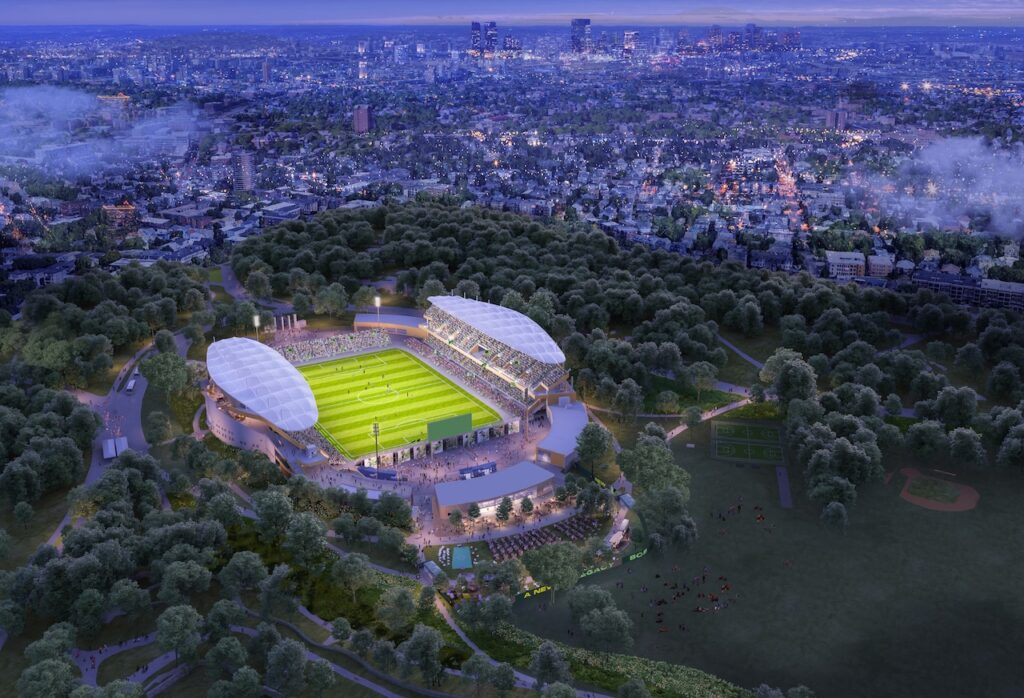The legal battle over the renovation of the historic White Stadium in Boston’s Franklin Park will continue as a group of residents opposed to the project appeal a judge’s decision to throw out their lawsuit.
Franklin Park Defenders, the group of plaintiffs that includes the nonprofit Emerald Necklace Conservancy (ENC), said late last week they plan to appeal the April decision that the land surrounding White Stadium was not protected under the Massachusetts Constitution.
They had argued that renovating the city-owned property for use in part by a new professional women’s soccer team would illegally change it from park and recreation land to private commercial use.
“It’s our mission to protect and support our public parks for future generations – even when it’s hard,” conservancy President Karen Mauney-Brodek said in a statement. “This proposal for Franklin Park is the biggest change to public land in Boston and the Emerald Necklace in at least half a century, and it hasn’t received the thorough legal vetting the public deserves. … We’re committed to partnering with the city, and anyone else, to make a fully public renovated White Stadium a reality.”
Since its construction in the 1940s, the aging venue has fallen into disrepair because the school district has been unable to keep up with maintenance costs. The interior of one of the two grandstands was locked off to the public after it was destroyed by a fire decades ago. It was never rebuilt and has since been demolished in preparation for constructing the new stadium.
The city has partnered with Boston Unity Soccer Partners, the owners of a new professional women’s soccer team to be known as Boston Legacy FC, to renovate the stadium at an estimated cost of at least $200 million.
The city’s portion, an estimated $90 million, will cover the renovation of the east grandstand for use by Boston Public Schools (BPS) students. The soccer team will cover the remainder and lease the venue for up to 20 games and 20 practices per year.
Outside of game and practice times, the facility will be open for Boston Public Schools, city and public use.
Opponents of the project have claimed that the renovation, which is already underway, would take away access to a public asset and would be an inappropriate use of city funds.
The Emerald Necklace Conservancy and a group of individual Boston residents initially filed the lawsuit in early 2024, but received an early loss as a judge declined to pause the project as the case played out.
During a three-day trial in March, the plaintiffs argued that the 14-acre parcel of land containing the stadium was protected by a constitutional provision known as Article 97. The rule requires a two-thirds majority vote of the state Legislature for any publicly owned parkland to be used for any other purpose. However, to be covered, the city of Boston would have had to explicitly record it as a park.
Suffolk Superior Court Judge Matthew Nestor ruled that the property was not parkland and had instead treated it as a school building since the stadium was initially constructed.
“There is simply inadequate evidence that the everyday use of the property evinces an unequivocal intent to dedicate the property as public parkland,” he wrote.
When announcing the appeal, the plaintiffs said Nestor had not addressed several of their legal arguments, including the effects the project would have on the surrounding Franklin Park, the legality of selling alcohol on school-owned property and their claims of violations of the trust that owns the land.
Not all members of the surrounding community oppose the project. After the Franklin Park Defenders announced their appeal, another group of residents denounced the decision to prolong the case, calling it “an irresponsible tantrum backed by deep pockets.”
“Rather than acting as a true champion for the community, ENC leadership has chosen obstruction over collaboration, using its position to disparage anyone who supports the stadium’s revitalization — including BPS students and families who want nothing more than a safe, vibrant place to play and compete,” said Dot Fennell and Beth Santos, two BPS mothers who have led a grassroots group of supporters of the project. “Boston Public School kids need partners, not lawsuits. ENC should drop this baseless fight and put its millions where its mission is — into the park, not the courtroom.”
A spokesperson for the city said that city officials had met with the ENC board after Nestor’s ruling to “pursue a collaborative approach” in the future and were “disappointed and frustrated” by the appeal.
“We will not be deterred from delivering the decades-delayed White Stadium renovation that generations of BPS students and park users deserve, and which is now finally underway,” the spokesperson said. “The renovated athletic complex will be open for student and public use at least 15 hours per day, more than 345 days per year, delivered at half the price for taxpayers because of our partnership with Boston Legacy, a professional women’s soccer team … Given the expense to Boston taxpayers of continuing to defend against ENC’s already-rejected claims, the city will carefully consider the future of its relationship with ENC to better protect residents and our parks.”
A spokesperson for Boston Legacy told the Boston Herald that the team was likewise disappointed, but remained “focused on advancing the work that is well underway as we prepare for the 2026 NWSL season.”


